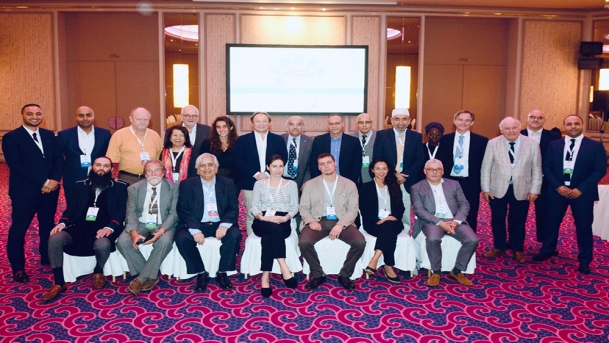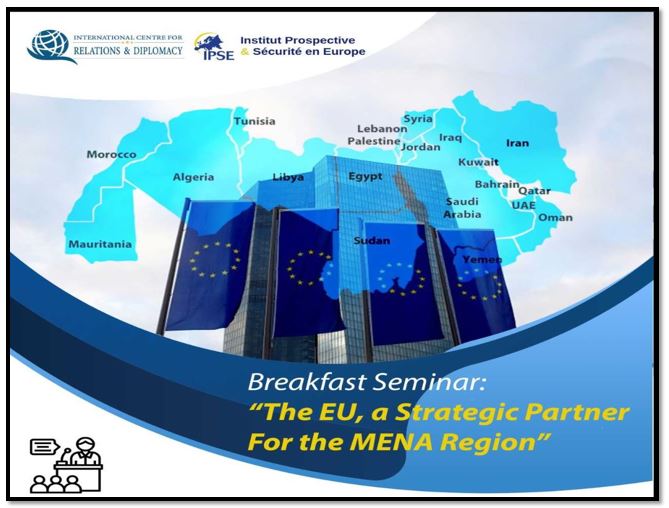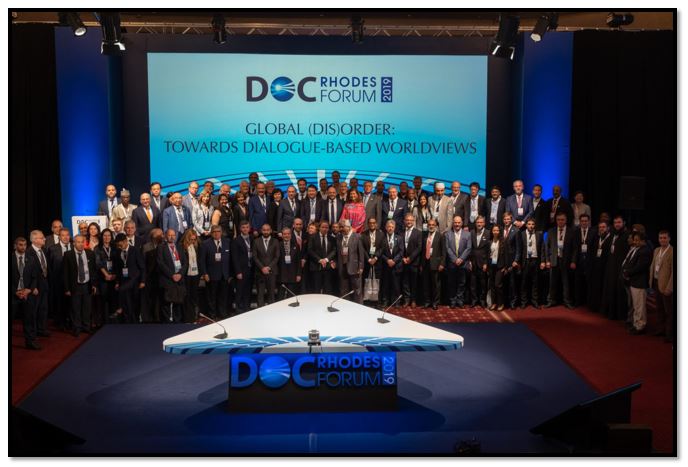
The second round of the Tunis Process, a joint project between the Berlin-based Dialogue of Civilizations Research Institute (DOC), Aljazeera Centre for Studies (AJCS), and the LBH Foundation shifted the focus into the Russian and Central Asian perspectives in a one-day symposium held October 13, 2019 in Rhodes, Greece.
The first round had been a two-day conference in Tunis June 28 and 29, 2019, and probed into the challenges and detractors of dialogue of civilizations between Europe and the Arab/Muslim world. The panelists in Tunis debated the religious and ideological tensions inherited from the colonial era, and the need to forge common paths between Muslims and non-Muslims across the Mediterranean. Dynamics between Russia and Central Asia show similarities between Europe and North Africa and the Levant. Accordingly, the Rhodes workshop addressed the topic from the Russian and Central Asian perspectives.
In his opening remarks, DOC CEO Jean-Christophe Bas explained how the outcomes of the initial symposium in Tunis “led us to develop the Rhodes event based on the idea that after acknowledging the ‘wounds of the past’, such as colonialism, we must bridge discourses and develop initiatives that move away from long-held prejudices, fears, and misconceptions. Many dominant narratives in both Muslim-majority countries and in Europe are widening the gap between communities and continue to hinder the co-creation of a common future.” He also emphasized the need for addressing certain emerging trends of far-right politics and inward ideologies; “Dismantling misperceptions – exacerbated by xenophobia, ideological extremism, and exclusion of the ‘other’ – and creating inclusive paths need be at the core of initiatives, from the grassroots level to international policies. Only then can concrete initiatives that will have meaningful and lasting impacts be developed.”
Dr. Ezzeddine Abdelmoula, head of research at AJCS, cautioned against the comparative incompatibility between ‘Europe’ and ‘Islam’. Instead, he proposed considering a better-nuanced parallel between ‘Europeans’ and ‘Muslims/Arabs’. He asserted, “If we manage to shift the debate from ideology to people, from theoretic frameworks to concrete citizens, then we can talk realistically about practices and policies.” This remark triggered more discussion about what can be termed as faulty lines of parallelism in the study of dialogue of civilizations.
 |
| Ezzeddine Abdelmoula delivering his comments to the symposium in Rhodes, Greece, October 13, 2019 [DOC] |
In the opening panel, Mohammed Cherkaoui, senior fellow at AJCS, delivered his paper “Three propositions for Repositioning the Dialogue-of-Civilizations Discourse”. He recalled the moment when late Austrian philosopher Hans Köchler wrote a letter to Marie-Pierre Herzog, then-Director of the Division of Philosophy at UNESCO September 26, 1972. Köchler proposed the idea of an international conference on “dialogue entre les différentes civilisations”. Two years later, a first conference on the role of intercultural dialogue, "The Cultural Self-comprehension of Nations", was held in Innsbruck, under the joint auspices of President Léopold Sédar Senghor of Senegal and President Rudolf Kirchschläger of Austria.
Cherkaoui examined how the global public sphere has reacted to the two rival narratives, which emerged in the post-Cold War era. First, Huntington’s ‘Clash of Civilizations’ and Fukuyama’s ‘Globalization of Liberalism/End of History’, which have benefited the Neocons’ and the Trumpists’ agenda of confrontation. Second, Edward Said’s critique of what he considered “the clash of ignorance” and Huntington’s pursuit of “continuing and expanding the Cold War by other means”. Also, the following initiatives of debunking the clash hypothesis, as proposed by the Iranians, the Turks, and the Spaniards, as ‘dialogue’ of ‘alliance’ of civilizations
Cherkaoui also raised a key question: “what to do with the deep gab between the ‘objectivity’ and the ‘subjectivity’ of understanding Islam in Europe and North America. Also, whether the dialogue of civilizations community has an effective discourse beyond the celebration of similarities between various religions and cultures.” He concluded his presentation by three propositions:
a. “The desired dialogue of civilizations remains misrepresented in international relations theory. This misrepresentation accentuates the need for reconstructing and repositioning the discourse of civilizational dialogue in the public sphere beyond the reference of clash. We need to shift our framework from the normative idealist perspective into a pragmatist mainstream advocacy. Time and technology are on our side as we envision building bridges, whereas Huntingtonians are still fixated on expanding their walls.
b. The dialogue of civilizations should not be only about shared spaces of common or celebrating common values, or restoring mutual perceptions. It is more than just reconciling the difference between the European interpretation and the Arab/Muslim interpretation of dialogue. We should not come back to this debate as distant cultural tribes with binary perceptions of us versus them, or any cultural dichotomy between the East and the West. It is rather a circular mode of interaction, rediscovery, and mutual recognition. Change happens with action, with motion, with interaction. This is why we need to consider the relationalism of dialogue as our new unit of analysis.
c. The state-centered UN system has not adopted promising mechanisms to address xenophobia, islamophobia, radicalism and other patterns of verbal or political violence. Instead, we can embrace the dialogue of Civilization as an alternative model of world order. It is high time for a new paradigm: a dialogue of civilizations beyond its Western-centric matrix.”
 |
| Partners of the Rhodes Forum, Greece October 11 and 12, 2019 [DOC] |
Aljazeera Centre for Studies was also highlighted a partner of the 17th Annual Rhodes Forum ““Word (Dis)order: Towards Dialogue-based Worldviews” held October 11 and 12, 2019, with the participation of delegations from more than 55 countries, including Mahamadou Issoufou President of Niger, the new member of the United Nations Security Council. Mr. Issoufou addressed the theme “Toward African Economic Miracles: Lessons learned: from the East Asian Model”.
Another well-attended panel addressed the theme “30 Years after the Fall of the Berlin Wall: In Search of a Roadmap and a Compass”, which raised an interesting exchange between Martin Schulz, President of the European Parliament [2012-2017]; Vyacheslav Nikonov, member of the State Duma of the Russian Federation and Dean of the Moscow State University School of Public Administration; Wang Huiyao, founder and President of the Center for China and Globalization; Shada Islam, director for Europe and Geopolitics at Friends of Europe, and Alphons J. Kanmantham, member of the Indian Parliament and former Union Minister, and Gabriela Ramos, OECD chief of staff and Sherpa to the G20. Among the questions that were addressed: a) what are the possible contours of an emerging new architecture of global governance? b) how can emerging international confrontations be prevented from escalating into open conflicts? C) is it possible to combine the conflicting global visions of individual actors in order to reach consensus on a road map? and D) which institutions are most relevant and what mechanisms are required in order to navigate the diverse.
 |
| [DOC] |
Other panels addressed a wide array of themes including “Chasing the Tiger: Economic Models of the Global South”, "Examining Geopolitical World Views: Battle of Giants?”, “Civilization State: Multiculturalism and Globalisation”, “Religion as a Political Factor and Ideology”, “The Role of Civil Society: Ascending or Descending?”, and “Twiplomacy: Diplomacy ad Governance in the Age of Social media.”
Dr. Cherkaoui and Dr. Abdelmoula also participated at “The EU, a Strategic Partner for the MENA Region” seminar held October 12, 2019. The discussion addressed the current challenges and prospects of the EU-MENA dialogue in the backdrop of the EU’s New Neighborhood Policy adopted in November 2015, with ambition of reconsidering the relations of the 28-EU member states with the 19 Middle Eastern and North African states in the perspective of the consolidation of anew democratic and diplomatic agenda.
 |
| Partners of the Rhodes Forum, Greece October 11 and 12, 2019 [DOC] |